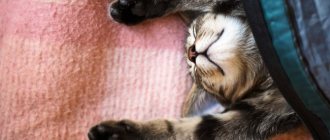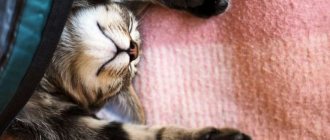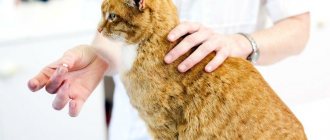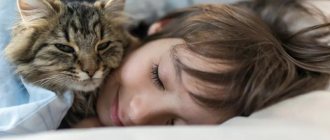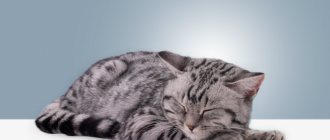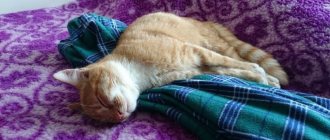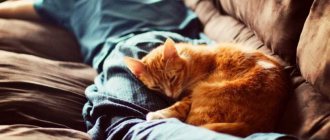Save the article:
No matter how hard a person tries to sleep longer, worries, affairs and responsibilities always interfere with him. But there is little that can distract cats from their dreams: on average, 16 hours a day they cause the envy of their owners, namely, they sleep serenely. If you calculate how much cats sleep during their lives, it turns out that they give 70% to sleep, and spend the remaining 30% on getting more tired and going to sleep.
Playing, tracking down prey, mastering new heights on the street or in the apartment - everything uses up a lot of cat energy, which can only be replenished by long and deep sleep.
Sleep standards for domestic cats
Each cat’s sleep norm is different: not only does it depend on the individual characteristics of the animal, but also on the energy expended during the day. One day the animal may be very tired from a long walk on the street, and on another day it may lie for half a day looking out the window - therefore, the duration of sleepy hours on these days will be different.
The total time allotted for dreaming can vary from 14 to 22 hours. What does total time mean: the pussy does not sleep “from bell to bell”, but easily alternates periods of sleep and activity. The cat gets the missing time in the arms of the owner and in any cozy corner. Cats sleep lightly, so they are easily interrupted by any loud sound, and, as if nothing had happened, they remain awake for some time, in order to soon fall asleep again.
Sleep norms for newborn kittens are different - they constantly doze next to their mother, waking up only to feed. Gradually, their waking hours increase, but they sleep somewhat less than adults. Older cats relapse into childhood and dream again constantly, waking up to litter and feed.
How long do adult cats sleep?
global $ads_google;
//data-ad-slot=”2475549904″ $ads_google = empty($ads_google) ? false : true; ?> if ($ads_google == false) {?> $ads_google = true; ?> } ?> If you compare how much an adult cat and a tiny newborn kitten sleeps per day , the kids will win. But then the emphasis shifts - the older ones sleep for a long time, and the kittens spend a lot of time playing.
For a healthy, tired cat, it will not be a deviation from the norm if he sleeps 20 hours in one day: his body may require such a long hibernation.
If an adult animal, which is one of the record holders for sleep among mammals, suddenly sleeps little, it means that it is in a state of stress. If this problem continues, the cat may lose a lot of weight and become ill due to nervousness.
In general, a cat needs to sleep 12-14 hours a day, but the total amount of hours spent on this is sometimes difficult to determine precisely because of the frequent alternation of periods of dreaming and activity.
How long do kittens sleep?
A healthy kitten at a tender age will easily sleep 22 hours in one day. This is not a reason to worry, but a variant of the norm. Age plays a significant role: if newly born kittens immediately fall asleep after eating, then cats at the age of one or two months play for a long time next to their mother, study the world around them and are in no hurry to fall asleep. A mother cat often spends much more time sleeping than her curious children.
If an older kitten sleeps a lot, and in addition to this, he has poor appetite and low activity, then this is a reason to consult a veterinarian with suspected illness.
Differences in sleep depending on breed
Cat breed has a significant impact on behavior and sleep duration. This is due to different types of nervous activity and temperament.
British, Scottish, Persian cats, Maine Coons and Redgalls sleep the longest. They are quite lazy and often fall asleep immediately after eating.
More active breeds include Siberian cats, Bengal cats, Abyssinians, Kurilian Bobtails and Egyptian Mau. Cats of these breeds love active games and hunting.
Siamese breeds cannot afford to sleep for too long. They are tense almost all the time and ready to attack, and relax for only a short time.
Hairless cat breeds - Sphynxes, Devon Rexes and others - constantly need warmth and care. They are ready to sleep a lot, but only next to their beloved owner. The rest of the time, animals can be unusually active.
How long do cats sleep after anesthesia?
The behavior of pets and their condition after surgery always worries worried owners.
If a cat is about to be sterilized, then naturally the owner will be concerned about how much she will sleep after the operation. The body cannot ignore anesthesia, so after it and surgery it will take time to recover. Some creatures recover from anesthesia very quickly and wake up immediately, while others take longer.
If we are talking about a cat, then the question of how long he will sleep after castration also has an answer: it all depends on the individual characteristics of the pet’s body. In any case, he will need the care and attention of his owner. The veterinarian will definitely give important recommendations on this matter.
Does posture matter?
Sleeping pets can tell their owner a lot. The position in which a cat sleeps depends on several factors:
- Ambient temperature;
- Feeling of security;
- Duration of sleep.
When the room is cool, the cat instinctively curls up into a ball, tucking its paws underneath and wrapping its tail around itself. If a pet hides its nose under its paws, then the cat is really very cold. By reducing the surface area of the body exposed to external factors, the cat loses much less heat and is protected from the cold. The higher the air temperature, the more relaxed the cat's body position, which does not need to accumulate heat.
There is a popular belief: if a cat sleeps with its paw covering its nose, it means that frost will soon hit.
On its stomach or side is the most common and natural position of a cat's body during sleep. The cat is calm and does not experience any problems. Cats can sleep on their side for hours. It is in this position that animals experience the deepest and most protracted dreams.
Sleep phases of cats
People who have cats in the house can constantly observe how a seemingly soundly sleeping pet suddenly jumps up and rushes at maximum speed to the kitchen, to the owner or to the door. For cats that have become well-adapted to resting during light naps, waking up abruptly is normal. These animals constantly pick up information from everywhere, so there is nothing strange in such a rapid succession of states.
Cat dreams are divided into two phases, which replace each other:
- slow phase: decreased blood pressure, low muscle activity, decreased heart rate, slow breathing. The eyes under closed eyelids, at the moment of falling asleep, slowly move a little and then stop
- fast phase: rapid heartbeat, change in breathing rate, rapid rotation of the eyes, slightly increased blood pressure and body temperature, possible shudders, movement of the limbs and ears.
The fast phase in adult cats takes up to 25% of the total time, in old cats 15%. The slow phase lasts 20-30 minutes, and then it is replaced by a fast phase for 5-7 minutes. Over a long period of sleep, the phases alternate several times.
What to do if your pet sleeps too much
If long sleep does not fit into your pet’s daily routine, but he suddenly begins to rest for a long time, you should be wary and also take a closer look at his health. In addition to drowsiness, the disease is indicated by the presence of the following symptoms:
- increased water consumption or refusal of it;
- lack of appetite;
- lack of response to external stimuli;
- diarrhea;
- vomit;
- false urge to urinate.
The presence of at least one of the listed symptoms indicates the need to visit a specialist. If these symptoms are not present, it may be due to the weather: cats, like people, can be weather dependent and feel sleepy on certain days.
Do cats dream?
global $ads_google;
//data-ad-slot=”2475549904″ $ads_google = empty($ads_google) ? false : true; ?> if ($ads_google == false) {?> $ads_google = true; ?> } ?> How much time cats sleep per day has been determined, now it’s interesting to find out whether four-legged friends have dreams. Neuroscientists studied this issue and came to the conclusion that domestic cats are no strangers to dreams. This is usually something that has to do with the cat's lifestyle. This could be a battle with a wild relative, an active pursuit of prey, exploration of a new territory, or something associated with strong emotions.
How does the kitten behave in its new home?
first time in a new home
will experience fear and anxiety. ... A small child may be running or playing with a kitten and accidentally scare the pet. Therefore, before bringing the animal into the apartment, calmly explain to the children that the baby does not need to be touched for the first week.
Interesting materials:
What is important in the teaching profession? What is Malakhov leading? What can you see through a 70mm telescope? What are the functional responsibilities of a laboratory assistant? What is included in the Southern Urals? What is included in a classic pedicure? What is included in the Leukoformula? What are the responsibilities of a school technician? What's included in the PS Plus Collection? What is included in the water supply system?
How and when do cats sleep?
If a cat does not sleep at the required hours, being in a relaxed state, but looks for a secret place for dreams, it means that she is not so comfortable next to her owner. Normally, a cat would rather prefer the master's bed than the corner under the sofa. An animal that completely trusts its owner easily falls asleep on his lap, turning over on its back and putting all four paws in front of it.
When a cat is 9 years old, she slept for about 6 years of that time.
The place to sleep will most often be located at some elevation, and it will be something soft and warm. The cat will stomp on the chosen bed, stretch, relaxing every muscle, and very quickly falls asleep.
There are also originals among cats, which seem to be smeared with honey on the owner’s laptop, important documents on the table or freshly ironed linen.
Veterinarian recommendations
Veterinarians recommend monitoring your pet's sleep. If the kitten cannot lie on one side for a long time and constantly changes position, looks lethargic after waking up, and does not respond to the owner’s attention, then you should be wary.
Quality sleep is a way for a kitten to maintain its health in good condition. Therefore, you should not disturb or wake up a resting animal. Lack of proper sleep will make your cat aggressive and can lead to problems with the nervous system.
Source
Cats sleeping problems
In cases where a cat, not exceeding its usual sleep norm, suddenly begins to constantly doze off and look drowsy, it is first determined whether this is due to pregnancy or weather conditions (excessive heat or extreme cold). If a cat spends more than 18 hours sleeping, then such drowsiness may come from some kind of disease. A cat's sleeping position can help identify the problem: a frozen posture like a sphinx or attempts to spread its limbs that are unusual for an animal indicate hyperthermia. Also, an excessive amount of sleep is an indicator of the onset of heart problems.
Other sleep disorders include insomnia. Stress caused by moving, the arrival of a new family member, or an influx of guests may be to blame here. Sometimes cats have seizures in their sleep - it’s better to film any oddities and then show it and the animal to a veterinarian.
What to do if your pet gets less rest
If you notice that your pet has begun to spend much more time in an active state, you need to pay attention to its physical and mental health. During sleep, the strength of any living organism is restored, but if after sleep the cat looks sleepy and lethargic, it needs to be taken to the veterinarian. Problems with the thyroid gland can cause a shortened rest period. If all the pet’s organs are in order, pay attention to its psychological comfort. Causes of stress can be, for example, moving or adding another pet to the house. In this situation, only time will help: in a couple of days the cat will get used to the new environment, and his sleep will return to normal.
Short rest is harmful for cats, so if you notice that your pet is not getting enough rest, make an appointment with your veterinarian

